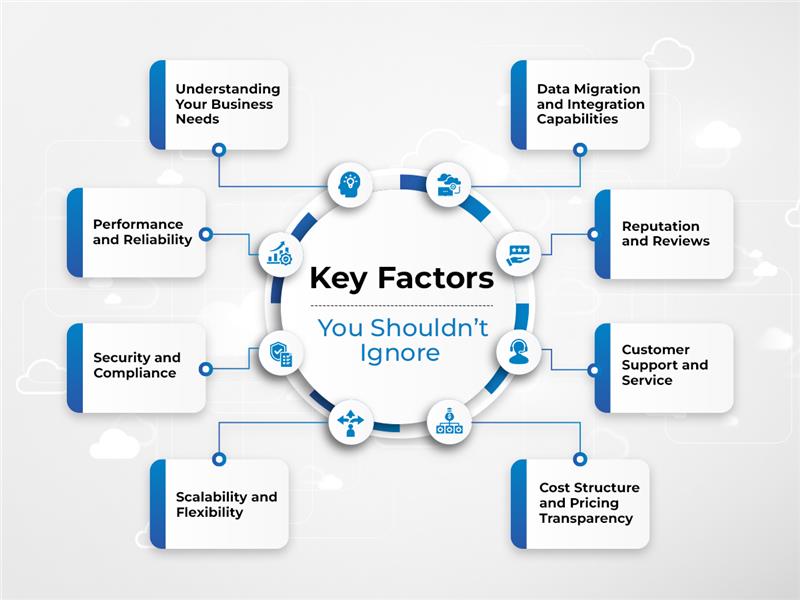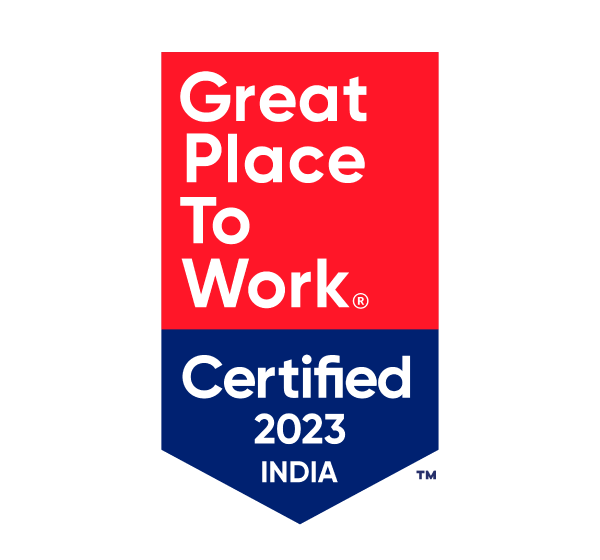Businesses of all sizes are moving their operations to the cloud, leveraging its flexibility, scalability, and cost-effectiveness. However, choosing the best cloud service provider (CSP) is a decision that requires careful consideration. With several options available, each with unique offerings, it’s easy to get overwhelmed.
To help you navigate this crucial decision, we’ve compiled key factors you shouldn’t ignore when selecting a cloud provider.

1. Understanding Your Business Needs
Before diving into comparisons between cloud service providers, you need to evaluate your own business needs. Not every cloud provider is a perfect fit for every business, so understanding what your organization requires will narrow down your choices.
Ask yourself:
- How much storage and computing power do I need?
- Do I require a public, private, or hybrid cloud?
- Will I need special features like artificial intelligence (AI) or machine learning (ML) tools?
- How critical is high availability and disaster recovery for my operations?
This step helps align your goals with the cloud service provider that offers the most suitable services, saving you time and potential headaches later. In this the role of best cloud service provider is superior, partners like Meridian Solutions, you can get the best solutions and services.
2. Performance and Reliability
Performance and uptime are key indicators of a CSP’s reliability. A provider’s uptime directly impacts your business operations, as downtime can lead to loss of revenue and productivity. Most reputable cloud providers guarantee a 99.9% uptime, but it’s crucial to understand their Service Level Agreements (SLAs) and how they respond to outages.
Questions to consider:
- What is the provider’s historical uptime record?
- Do they offer compensation for downtime under their SLAs?
- How robust is their infrastructure in terms of performance, speed, and availability?
Review real-time performance metrics and case studies from existing customers to gauge the reliability of potential providers.
3. Security and Compliance
Security is a top priority when it comes to cloud services. Data breaches and cyber-attacks are constant threats, and your CSP must have the latest security protocols in place.
Look for cloud providers that offer:
- Encryption: Both in transit and at rest, to protect your data from unauthorized access.
- Data Backup and Disaster Recovery: Regular backups and robust disaster recovery plans ensure your data is safe, even in worst-case scenarios.
- Access Control: Multi-factor authentication (MFA) and role-based access controls (RBAC) to restrict who can access critical information.
Compliance is also a critical consideration, especially if your business handles sensitive data such as healthcare records (HIPAA compliance) or payment card information (PCI-DSS compliance). Make sure your chosen provider complies with relevant regulations and industry standards.
4. Scalability and Flexibility
As your business grows, your cloud services must be able to grow with you. This is where scalability comes in. A good cloud provider should allow you to scale resources up or down based on demand, without having to overhaul your system.
There are two key types of scalability:
- Vertical Scalability: Adding more power to your existing infrastructure (e.g., more CPU or RAM).
- Horizontal Scalability: Adding more servers to handle increasing loads.
Cloud providers such as AWS, Microsoft Azure, and Google Cloud are known for their excellent scalability options, enabling businesses to expand seamlessly. Flexibility also matters—ensure the provider supports hybrid and multi-cloud architectures if you need to integrate services across different cloud platforms.
5. Cost Structure and Pricing Transparency
Cloud services can offer significant cost savings over traditional infrastructure, but it’s vital to choose a provider with a transparent and flexible pricing model. Many providers offer a “pay-as-you-go” system, which charges you only for the resources you use. This is especially beneficial for businesses with fluctuating workloads.
However, cloud costs can easily spiral out of control if you don’t understand the pricing structure. Always ask for:
- A clear breakdown of costs, including hidden fees.
- Pricing models for different usage tiers.
- Free tiers or trial periods to test out services before committing.
- Potential savings through long-term commitments or reserved instances.
Using cost management tools and setting spending limits can help keep expenses in check.
6. Customer Support and Service
The quality of customer support can make or break your experience with a cloud provider. If an issue arises, you need to know that the provider will respond promptly and efficiently.
Consider:
- Availability: Is support available 24/7? Does it cover all your global operations?
- Channels of Support: Are support services offered via phone, email, chat, or ticket-based systems? Can you escalate critical issues quickly?
- Technical Expertise: Does the provider have a team of cloud-certified engineers to help with complex issues?
Reading reviews and testimonials can provide insight into how well the provider handles customer support.
7. Data Migration and Integration Capabilities
Migrating your data to the cloud should be as seamless as possible. Providers should offer robust tools to facilitate data migration with minimal downtime or data loss. If your business relies on certain software or applications, make sure the cloud provider supports easy integration with those tools.
Look for providers that offer:
- Migration Tools: Automated tools that simplify the transition of data and applications.
- Third-party Integrations: Compatibility with popular software (e.g., Salesforce, SAP) and easy API integrations.
- Consultation and Support: Assistance throughout the migration process to reduce disruptions.
8. Reputation and Reviews
Lastly, reputation matters. The cloud service provider you choose will become a long-term partner in your business operations, so you need a provider with a proven track record. Research independent reviews, case studies, and user testimonials to get a feel for the provider’s reliability, customer satisfaction, and long-term viability.
Major providers like Amazon Web Services (AWS), Microsoft Azure, Google Cloud, and IBM have built strong reputations, but the best cloud service provider for your business will depend on your unique needs and objectives.
Meridian Solutions: The Best Cloud Service Provider for Your Business
When it comes to cloud services, Meridian Solutions stands out as one of the top cloud service providers in the industry. As a Tier 1 Cloud Solutions Partner (CSP) and a Gold Certified Cloud Productivity Partner of Microsoft, Meridian Solutions offers unparalleled expertise in delivering customized cloud and security solutions. Whether you are looking to transition your business applications to the cloud, optimize cloud usage, or enhance your IT security, Meridian Solutions provides seamless integration, proactive guidance, and 24/7 customer support to ensure your business operates efficiently.
Their deep understanding of business needs and commitment to innovation makes Meridian Solutions the ideal partner for organizations seeking reliable, scalable, and secure cloud solutions.
Conclusion
Choosing the best cloud service provider is a crucial decision that can impact your business’s operations, security, and growth. By focusing on key factors such as performance, security, scalability, pricing, customer support, and migration capabilities, you can make an informed decision that aligns with your business goals.
Evaluate your needs carefully, do your research, and take the time to find the right cloud partner for your journey into the cloud.









